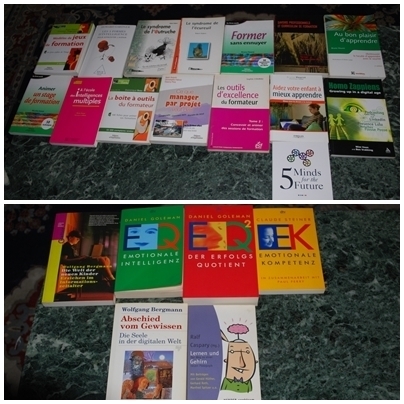
Gust MEES: In 21st Century we are mostly looking for online tools and we forget about the best tool we can have, a book! Do you still know what a book looks like!?
I read a lot, must have +/- 1,000 books at home, not counting the magazines of different Topics... I am a Life Long Learner (Hashtag #LLL) and it is a pleasure for me to read a book, especially in summer time... I "eat" them actually, brain food ;)
I suggest to you to take a break from Internet and to read some times also a book and to use it as a tool also; thus meaning:
Read it quick, make some bookmarking, higlight the interested parts of it... write something (your ideas, thoughts...) close to the parts who made your interest and later on you read the book again, ONLY your personal remarks, highlited stuff and...
You will then remark how good a book is as a tool, an "Offline Tool"! OK, you won't be able to resell it (don't think for once at the commercial...), but at least you will have learned something and after a certain time when reading again as you might have a look on it for further researches (brain doesn't memorize everything...) your valuable remarks bring you back to your "old" thoughts and way for further thinking...!
My book selection in EN, FR, DE (books I read already over the last 10 years...):
French language:
- Les outils d’excellence du formateur (Sophie COURAU)
- La boîte à outils du formateur (Dominique BEAU)
- Animer un stage de formation (Nicolas JOUSSE)
- Au bon plaisir d’apprendre (Bruno HOURST)… (Re)trouver la faculté d’apprendre avec le sourire
- Modèles de jeux de formation (Bruno HOURST et Sivasailam THIAGARAJAN)
- Savoirs professionnels et curriculum de formation (Yves LENOIR/Marie-Hélène BOUILLIER-OUDOT)
- Ce que manager par projet veut dire (Alain ASQUIN/Christophe FALCOZ/Thierry PICQ)
- Le syndrome de l’autruche (Rober GOBERT)
- Le syndrome de l’écureuil (Robert GOBERT)
- À l’école des intelligences multiples (Bruno HOURST)
- Les 5 formes d’intelligence (Howard GARDNER)
- Intégrer les intelligences multiples dans votre école (Thomas-R. HOERR)
- Aidez votre enfant à mieux apprendre (Bruno HOURST)
- À reculons, comme une écrevisse : Guerres chaudes et populisme médiatique (Umberto ECO)
- Guide pratique de l’écrivain (Paul DESALMAND)
- Publier son livre (Nicolas DELECOURT/Laurence HAPPE-DURIEUX)
- Le livre de la sagesse de Confucius (Les grands textes spirituels/Éditions du Rocher)
- Les entretiens de Confucius (Connaissances de l’orient/GALLIMARD)
German language (Deutsch)
- EQ2: Der Erfolgs Quotient (Daniel GOLEMAN)
- Lernen und Gehirn /Der Weg zu einer neuen Pädagogik (Herder Spektrum)
- EQ: Emotionale Intelligenz (Daniel GOLEMAN)
- Emotionale Kompetenz (Claude STEINER)
- Soziale Intelligenz. Wer auf andere zugehen kann, hat mehr vom Leben Daniel GOLEMAN)
- Die Welt der neuen Kinder/Erziehen im Informations-Zeitalter (Wolfgang BERGMANN)
- Abschied vom Gewissen/Die Seele ind der digitalen Welt (Wolfgang BERGMANN)
English language
- Homo Zappiens/Growing up in a digital age (Wim VEEN and Ben VRAKKING)
- 5 Minds For The Future (Howard GARDNER)
I met personaly Bruno HOURST, Robert GOBERT and Wim VEEN and I am working since eight years (2010), giving courses about ICT (mostly for adults and seniors, but also for young people) based on Howard GARDNER’s and Daniel GOLEMAN’s knowledge…
===> By having understood the context of those books you will be able to: A win-win situation between course instructor (coach) and learners which brings out a maximum to the learner, the most important… And ALSO you will get Critical-Thinking Skills...<===
BTW: these books are still "in" and will give you valuable information about the digital age of learning and how people are learning...
Links of these books here (and more...):
http://gustmees.wordpress.com/2012/04/14/21st-century-howto-guide-for-teaching-people/



 Your new post is loading...
Your new post is loading...






